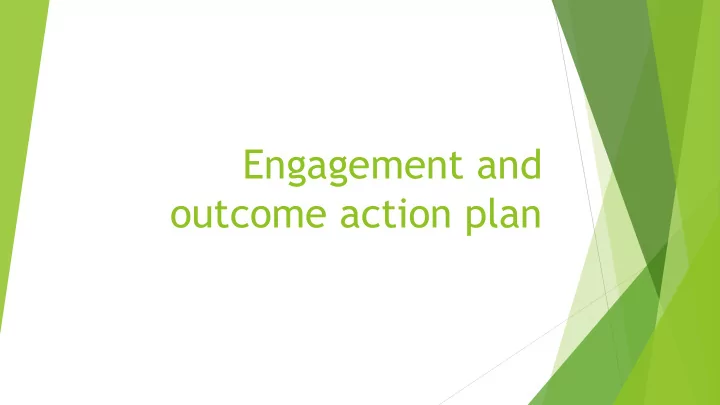

Engagement and outcome action plan
Improving home/school communication
Left is a made up version of the type of information parents will be able to see At a glance parents, students and teachers will be able to see how well students are performing in every subject
This information will be shown as ‘flight paths’ in every subject
Student timetables will be available online
As well as a detailed analysis report on a subject by subject basis. Our new assessment model will allow a greater level of depth for all stakeholders. What is behind each grade?
New Assessment Model Every subject, in every year group will be completing calendared assessments This information will feed into the online tracking system seen on previous slides Every department will moderate their results and adjust lesson planning to suit the needs of the learners Students will be given detailed and focused ‘learning plans’ based on these assessments
Year 11 Year 10 Year 9 Year 8 Year 7 Double Opt Option Science English Maths Option Science English Maths Science English Maths Science English Maths Science English Maths 13/03/2017 20/03/2017 27/03/2017 03/04/2017 10/04/2017 17/04/2017 24/04/2017 Moderation Data Collection Assessment 02/05/2017 08/05/2017 15/05/2017 22/05/2017 29/05/2017 05/06/2017 12/06/2017 19/06/2017 26/06/2017 03/07/2017 10/07/2017 17/07/2017
Feedback to students- what can you expect to see? What Went Well/Even Better If/ Pupil Response, Action, Using this holistic approach in marking of students’ work evaluates his/her subject skills and knowledge gaps identifies what he/she needs to do to extend their knowledge and skills identifies literacy and numeracy gaps. achieves or exceeds students’ age- related expectations. What Went Well/Even Better If/ Student Response, Action Mathematics example: A student in Year 7 is calculating tens and units and most of the answers in the written tasks completed over two weeks are inaccurate. It is clear from analysing his answers that he has not fully understood the basic concept of a number line and counting on ( ARE: emerging) The feedback could be along the lines of : WWW: presentation and layout is neat /good use of ruler / tens and units columns are smart – well done! EBI: you have not understood how to use a number line and that would help you Next steps: work out the answers in examples A showing the number line and then work out examples B NOT using the number line : how confident are you now? **** Extension task: work out these examples using hundreds, tens and units – p6 Ex A and solve the problem Student completes the work and evaluates how confident he is- self checking Teacher marks and dates the work and checks the confidence of student in using hundreds tens and units and transfer of skill to problem solving.
Maths Assessment Action Plan New 9-1 GCSE specifications in maths are largely based around numerical reasoning and ‘arithmetic skills’
Maths Assessment Action Plan In order to prepare our KS3 learners for the new style of questions students in year 7, 8 and 9 will be completing a ‘number’ unit of work This will generate a great deal of information about specific strengths and weaknesses Students will be retested on these topics to show progress All of this information will be fed into our online tracking portal which parents will be able to view
Diagnostic Test
Number and Place Value 1a: Can read, write and order whole numbers up to 10 000 000 and use the symbols =, <, >, ≤, ≥
Key Vocabulary 1 ones, tens, hundreds, thousands, ten thousand, hundred thousand, million digit, one-, two-, three- or four-digit number stands for , represents, >, greater than, more than, larger than, bigger than <, less than, fewer than, smaller than ≥, greater than or equal to ≤, less than or equal to greatest, most, largest, biggest, least, fewest, smallest, one… ten… one hundred… one thousand more/less compare, order, size, ascending/descending order
Probing Questions 1 What is the value of the 3 digit in………..? 3000 5300 5030 40203 3,456,721
Show My Homework
This will be implemented from Monday 3/4/17
Recommend
More recommend